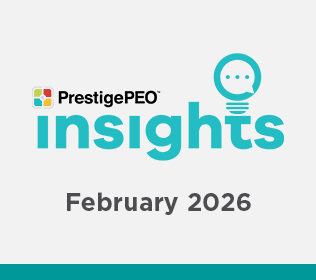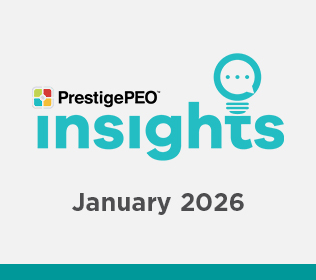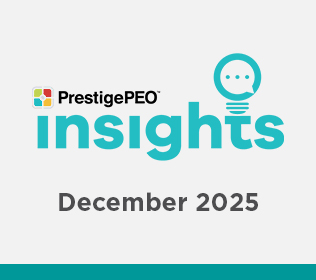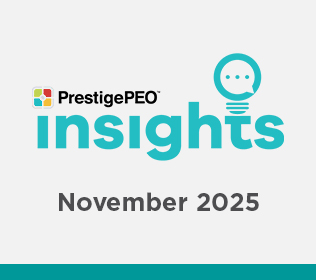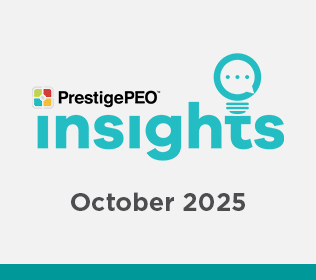
The latest news relevant to you and your business
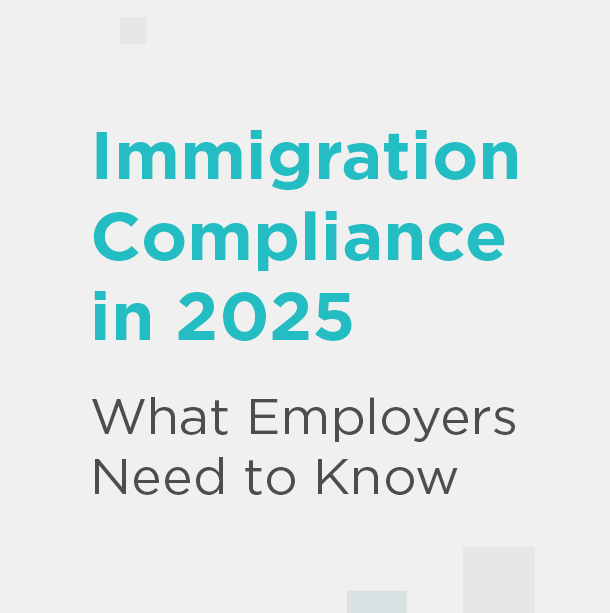

Immigration Compliance is Changing – Are You Ready?
Immigration policies and enforcement priorities are shifting rapidly in 2025, and employers must stay ahead of the curve to avoid compliance risks.
If you missed our critical April 16th webinar, watch the recording featuring legal expert Brian Coughlin (Partner, Fisher Phillips) and Elisabeth Shaw (VP & General Counsel, PrestigePEO). Together, they explore the evolving landscape of I-9 verification, ICE audits, recordkeeping, and the legal distinctions between Executive and Court Orders that could directly impact your workforce.
This session offers valuable strategies for protecting your business and supporting your employees in today’s regulatory climate.
Do you have accurate job descriptions for your active employees? While many companies maintain descriptions for open roles, reviewing and updating the descriptions for those already filled regularly is just as important.
As employees grow in their roles and business needs change, job descriptions often fall out of sync with day-to-day responsibilities. Without updates, managers may struggle to set clear expectations, evaluate performance, or remain compliant with HR best practices.
Why You Should Keep Job Descriptions Current:
- They communicate role expectations and responsibilities.
- They assist with recruitment when the role opens again.
- They help define required skills, qualifications, and experience.
- They support performance evaluations and growth planning.
- They provide the basis for determining FLSA (exempt vs. non-exempt) status.
- They outline essential job functions, which are crucial when discussing reasonable accommodation under the ADA.
- They help determine modified duty availability after a work-related injury.
Need help getting started?
Your PrestigePEO HR Business Partner supports you in reviewing, refreshing, or creating job descriptions that align with your evolving workforce. Contact us today to ensure your team is set up for clarity, compliance, and success.

Important Reminder: NY State Withholding Exemption Expiring Soon
Act by April 30 to Avoid Default Withholding Status
If you are currently marked as exempt from New York State income tax withholding, please note that your exemption status will expire on April 30, 2025. To remain compliant and avoid default withholding settings, please log in to your Employee Portal and complete a new IT-2104 form by the deadline.
If no updates are made by April 30, your withholding will automatically be adjusted to Single, 0 Allowances per state guidelines.
Have you already updated your form on or after January 1, 2025? No further action is needed.
For questions, please get in touch with your Payroll Specialist.

Improve Employee Well-Being with Smart Financial Tools
FinFit is a no-cost, voluntary benefit that helps employees manage everyday expenses, build savings, and plan for the future. With budgeting tools, short-term loans, and educational resources, it’s a simple way to support your team’s financial wellness. Learn more of the value of FinFit!

Modern, Fast, and Flexible Pay Card Access
Juice Financial offers a convenient pay card solution for employees who prefer not to use a traditional bank. With instant access to funds, a digital banking experience, and the ability to manage everything through the Juice app, it’s a faster, smarter way to get paid.

Just in Case You Missed It:
Watch this Essential Webinar on Managing Discipline and Termination the Right Way.
Mishandling discipline and termination can expose your business to serious risk.
In this must-watch webinar, our HR experts explain how to document performance issues, conduct compliant disciplinary conversations, and navigate terminations with confidence and fairness.
In case you missed it, the whole recording is now available.

Key Compliance Updates for Your Business
California Pushes to Ban “Ghost Job Postings”
The issues around the term “ghost job postings” are getting attention from regulators, and employers need to understand the risks of engaging in these types of activities. Ghost postings refer to job ads for positions that are not actively being filled. Sometimes companies post these roles to gather resumes (just in case) to study the labor market. While these practices may have seemed harmless or strategic in the past, new legislation in states like California is working to ban them altogether. Why ban ghost job postings? Because they can mislead job seekers, create confusion, and damage trust, and a major reason is not to waste applicants’ time. Proposed laws would force compliance requirements and penalties for companies found to be engaging in this practice without legitimate hiring intent. To stay on the safe side employers should only post jobs that are actively being recruited for and ensure all job ads are updated regularly. We will continue to monitor these proposed laws and provide updates accordingly.
PrestigePEO is here to help.
PrestigePEO is focused on supporting your business. If you have any questions about this ruling, or any other matters, please contact us.
California Pay Data Reporting for 2024
As another reminder regarding the upcoming California Pay Data Reporting cycle, California employers are entering the third year of the expanded California Pay Data Reporting requirements. This annual Pay Data Report is due by May 14, 2025. Employers are encouraged to start planning now for this deadline, to ensure compliance with the increasingly complex requirements.
This reporting requirement applies to all private employers of who “regularly employ” 100 or more employees and at least one (1) employee in California and/or employers who hired 100 or more workers through labor contractors and at least one (1) in California. Employers will be required to submit Employers Reports and Labor Contractor Reports if they fall under both criteria and for employers with multiple establishments, a report must be submitted for each establishment. For employers with multiple legal entities and multiple establishments, the report must be submitted by legal entity for each establishment.
The California Pay Data reporting requirements are very fact specific. Employers are encouraged to work with their various stakeholders soon to ensure that the necessary time is considered when planning for this May 14, 2025, deadline.
PrestigePEO is here to help.
PrestigePEO is focused on supporting your business. If you have any questions regarding the California Pay Data Reporting requirements, please contact us.
California Lawmakers Propose Restrictions on AI Use in Employment Decisions and other AI Targeted Protections
As California continues to break ground with the use of Artificial Intelligence “AI,” lawmakers propose limitations on the use of automated decision systems (ADS) in employment related settings that include hiring, promoting, disciplining, and termination decisions. Senate Bill 7 seeks to regulate employers use of AI forward management tools designed to help manage workforce issues. This bill would apply to all employers, without exception for size. If passed, the bill would create guardrails around the use of automated decision systems and would require a number of compliance obligations. Included in these requirements is a mandate that human oversight be involved in all major employment decisions, a notice requirement informing employees when ADS will be used in employment decisions, a requirement to ensure that employees have access to and ability to correct all data used by ADS, and an appeals process by which employees could contest ADS related employment decisions. There are a number of prohibited uses as well, including the use of ADS functions that predict employee behavior, the use of systems that collect sensitive personal data that may lead to discrimination of protected classes, and relying on customer ratings or similar AI-generated algorithms for employment decisions.
Additional workplace regulations being considered include Assembly Bill 1018 which seeks to create restrictions on the use of AI in employment but on a broader scale imposed on both employers and AI vendors. Restrictions would impact data retention policies, impose audit requirements, and provide for comprehensive risks assessments for AI utilized hiring methods.
California employers are encouraged to keep an eye on whether these proposed new laws pass and whether significant debate ensues, which may modify the original language of the proposed bills. These bills have until mid-September to reach Governor Newsom, who would have until October 12 to sign or veto the passed legislation.
An additional effort by the state to take control of the use of AI in the employment setting includes the March 21 decision of California Civil Council of the Civil Rights Department (CRD) to approve rules regarding the use of ADS in the workplace targeted directly at protecting against employment discrimination. These new rules must now be passed by the Office of Administrative Law (OAL) and finally, published by the Secretary of State. If approved, these rules will likely become effective on July 1, 2025. Included in these rules will be a clear definition of what “automated-decisions” systems are and how they work, clear prohibition against ADS discrimination, an expansion of liability for those principles involved in the development of ADS technology and increased record keeping requirements.
PrestigePEO is here to help and will continue to monitor this proposed legislation and new rules and provide updates accordingly. If you have any questions, please contact your HRBP for help.
Preparing for Colorado’s 2026 AI Employment Law: Compliance Steps Employers Should Take Now to be Prepared
As Colorado moves toward implementing AI-related employment laws by 2026, employers need to be on alert. A recent review by the state’s AI Task Force has revealed several compliance concerns that businesses should begin preparing for now, especially those that already rely on AI tools for hiring, evaluation, or HR processes. The upcoming law is designed to add structure around the use of automated systems in employment decisions. Early analysis suggests that compliance may be more complex than initially expected. Businesses that use AI to assist with screening applicants, ranking resumes, or even making hiring decisions should begin evaluating their tools and processes now. This includes understanding how these systems are built, what data they rely on, and whether bias or discrimination could be embedded in their design or outcomes.
Even though the law won’t take effect until 2026, early planning will be important. Employers should audit their AI systems now, document how decisions are made, and build cross-functional oversight. This is an opportunity to create better processes, not just a legal burden. Being proactive now can help your business avoid costly missteps later and build a stronger, more equitable hiring foundation.
PrestigePEO is here to help and is focused on supporting your business. If you have any questions about this ruling, or any other matters, please contact us.
Client New Location Request Reminder
As a reminder, when an employee is hired in a state in which the client does not currently have an appropriate location to assign the employee to, a new location form needs to be completed and submitted.
As soon as the employee accepts employment and prior to on-boarding the new hire, the request should be submitted to PrestigePEO.
The form should contain:
- Clients Legal name,
- Clients ID code,
- The proper state for the requested location,
- Complete address of requested location,
- The start date, which will be a future date,
- Basic employee information,
- Whether the EE works in an office or from home, and if travel is involved,
- For New York based clients, the convenience of the employer test needs completed,
- If Workers Compensation coverage is provided by a Prestige policy or outside policy,
- The name of the person making the request, and
- The date the form was completed.
Having all requested information included on the form ensures there are no delays in completing the request.
The processing time for a Client New Location Request is ten (10) business days.
There are several states that require additional information prior to a location being set up. They are as follows:
- Nevada – the client will need to register in the state and create an Unemployment account.
- Ohio – an individual policy will need to be secured by the client.
- Vermont – the PEO will need a POA to report on behalf of the client.
- Washington State – the client will need to register with the state, pay the registration fee, and secure a worker’s comp policy from the state.
PrestigePEO is here to help. Please reach out to your Human Resource Business Partner for additional information or with any questions.
United States Treasury Department Shifts Gears on the Corporate Transparency Act
After monitoring the shifting deadlines imposed by the Financial Crimes Enforcement Network (FinCEN) regarding the filing requirements of either initial, updated, and/or corrected beneficial ownership reports (BOI) under the Corporate Transparency Act (CTA), as well as the related court challenges, the U.S Department of the Treasury announced in early March that it will no longer be enforcing penalties or fines associated with the BOI reporting rule violations under the current deadlines and it will no longer enforce any penalties or fines against U.S. citizens or domestic reporting companies or their beneficial owners under the upcoming reporting rule changes. Furthermore, the Treasury Department is considering a proposed rule that will narrow enforcement provisions to foreign reporting companies only, which would otherwise remove such reporting obligations from U.S. citizens and domestic companies entirely.
PrestigePEO is here to help and will continue to monitor these changes. If you any questions, please reach out to your HRBP for help.
Court Ruling Reinforces ADA Accommodation Standards
In a recent decision, Tudor v. Whitehall Central School District, the Second Circuit Court of Appeals, covering New York, Connecticut, and Vermont, reaffirmed the importance of employers engaging in the ADA-required interactive process. The court held that a reasonable accommodation may be required even if a qualified employee can perform the essential functions of their job without one.
The case involved a teacher with post-traumatic stress disorder (PTSD) who had previously been permitted to leave campus during prep periods to manage her symptoms. When the school district rescinded that long-standing accommodation, she requested that it be reinstated. The district declined, partly because she acknowledged being able to perform her duties without the accommodation, and she brought a failure to accommodate claim. The Second Circuit rejected that reasoning, holding that the ADA requires employers to accommodate known disabilities unless doing so would impose an undue hardship, regardless of whether the employee can perform the essential functions without it.
Key Takeaway for Employers
While the ruling doesn’t change the core guidance we typically give clients, which is to engage in the interactive process and provide reasonable accommodations to qualified employees, the case offers a notable clarification. An employee’s ability to perform their job duties without an accommodation does not eliminate the employer’s legal obligation to evaluate and potentially provide one.
This decision reminds us to approach all accommodation requests thoughtfully and consistently with ADA standards, even when the employee performs well without any accommodation.
PrestigePEO is here to help your business maintain compliance and stay ahead of the curve. Please contact your HRBP with any questions you may have.
Executive Orders 14151 and 14173: Fourth Circuit Lifts Injunction Issued by Federal District Court:
An action was brought, in federal district court in Maryland, to challenge Executive Order 14151, Ending Racial and Wasteful Government DEI Programs and Preferencing and Executive Order 14173, Ending Illegal Discrimination and Restoring Merit-Based Opportunity; the action was brough by the Mayor and City Council of Baltimore, Maryland; Restaurant Opportunities Centers United, the National Association of Diversity Officers in Higher Education, and the American association of University Professors. On February 21, 2025, a federal district court judge issued a preliminary injunction against numerous elements of those Executive Orders. The matter was subsequently appealed and brought before the U.S. Court of Appeals for the Fourth Circuit, which stayed enforcement of the preliminary injunction.
What does this mean for employers?
The executive orders issued under the current administration directly impact federal contractors and subcontractors, recipients of federal grant money, or other businesses doing business with the United States federal government. With that said, other private sector employers should be mindful of the stance the federal government is taking towards Diversity, Equity, and Inclusion (DEI) and Diversity, Equity, Inclusion, and Accessibility (DEIA) polices and initiatives.
Employers can evaluate their policies to ensure they align with current federal anti-discrimination laws and guidelines.
PrestigePEO will continue to monitor any changes to federal anti-discrimination laws, guidelines, and other relevant legislation or executive orders. Should you have any additional questions, please contact your HR Business Partner.
IRS Guidance for Alternate Manner to Provide Forms 1095-B and 1095-C
The IRS issued Notice 2025-15 as a guidance tool after the 2024 Paperwork Burden Reduction Act (PBRA) allowed for an alternative method of providing Forms 1095-B and 1095-C to individuals who should receive them.
Under the PBRA, employers are no longer limited to furnishing Forms 1095-B and 1095-C by January 31 (or the automatic 30-day extension afforded by the IRS). Employers may now choose to furnish the forms using the alternate method. The alternate method requires a notice informing employees that they may receive copies of either Form 1095-B or Form 1095-C upon request. The notice should be clear, conspicuous, and available to employees in a reasonably accessible location on the employer’s website.
The PBRA left some ambiguity about when the notice was required to be posted under the alternative method of furnishing Forms 1095-B and 1095-C. IRS Notice 2025-15 clears up the ambiguity and provides the same timeframe parameters for the alternative method as for the traditional—the posting must be made by January 31 (or by the automatic 30-day extension afforded by the IRS).
PrestigePEO is here to help. Please get in touch with your HR Business Partner if you have any questions about the guidelines for furnishing Forms 1095-B or 1095-C.
Massachusetts Lie Detector Notice Requirement
The Commonwealth of Massachusetts prohibits using lie detectors as a condition of employment. If it is possible for a job posting or application to be completed by an individual in Massachusetts, the posting, application, or descriptions must contain the following notice:
It is unlawful in Massachusetts to require or administer a lie detector test as a condition of employment or continued employment. An employer who violates this law shall be subject to criminal penalties and civil liability.
If the notice is not within such postings and provided to applicants, employers can be liable for fines per violation and potentially for reasonable attorneys’ fees and treble damages.
This law impacts employers within Massachusetts and employers outside of Massachusetts that post jobs that an applicant in Massachusetts could apply to. Employers should review their current job postings to ensure compliance and draft future job postings with this law in mind.
New York Legislature Targets Worker Misclassification
The New York State Senate has passed legislation to curb the misclassification of employees as independent contractors. Senate Bill S1514, approved on March 4, 2025, would authorize the Commissioner of Labor to issue stop-work orders against businesses that knowingly misclassify workers or provide false information about their workforce to insurance carriers.
Under the bill, employers in violation would receive written notice and have 72 hours to correct the issue before the stop-work order takes effect. If they fail to comply, operations at the site of the violation could be shut down until the business comes into compliance and pays any required penalties. Penalties could range from $1,000 to $5,000 per day, and employees affected by the shutdown would be entitled to receive their regular wages for up to ten days. Employers would have the right to contest the order within ten days of its issuance.
A companion bill, Assembly Bill A6664, was introduced in the State Assembly on March 7, 2025, and is currently being reviewed by the Assembly Labor Committee. The coordinated push by both chambers signals that worker classification remains a top priority for state lawmakers.
Employers in New York should take this opportunity to review their use and classification of independent contractors to ensure compliance with current classification laws.
Given the evolving landscape, PrestigePEO continues to monitor the situation and will help keep your business informed and proactive.
New York Revises Form NYS-45 for 2025
The New York State Department of Taxation and Finance (DTF) has implemented updates to Form NYS-45, the Quarterly Combined Withholding, Wage Reporting, and Unemployment Insurance Return, to simplify and improve the employer filing process. These changes took effect with returns due in March 2025 and apply to both paper submissions and online filings through the DTF’s Web File system.
What’s New:
- Unified Filing Requirement: Employers must now submit Parts A (Withholding), B (Wage Reporting), and C (Unemployment Insurance) together as one complete return. Submitting any section separately is no longer permitted.
- Combined Wage Reporting: If employers report both “wages” and “other wages,” they must include both in a single return.
- Use the 2025 Form: To ensure proper processing, businesses must use the updated version of Form NYS-45 with a 2025 revision date. Older versions will not be accepted for current or future filings.
These changes reflect New York State’s efforts to streamline payroll tax administration and reduce reporting errors. Employers should ensure their systems and processes are updated accordingly to remain compliant.
PrestigePEO is here to help your business maintain compliance and stay ahead of the curve. Please get in touch with your HRBP with any questions you may have.
State Paid Family & Medical Leave Updates in Maryland and Pennsylvania
Maryland:
The Maryland Department of Labor (Maryland DOL) previously announced its proposal to delay the start of the state’s Family and Medical Leave Insurance (FAMLI) program by pushing the start of payroll deductions from July 2025 to January 1, 2027. This proposed change will not go into effect until there is legislative action by the lawmakers in Maryland. Without legislative action, the deduction start date will remain July 1, 2025.
PrestigePEO will continue to monitor the status of Maryland’s FAMLI program deduction effective date and will provide updates as they become available.
Pennsylvania:
Pennsylvania legislators are again introducing House Bill 200 (HB200) to establish statewide paid family and medical leave. Similar to other states with such programs, if HB200 becomes law, qualifying employees would be afforded paid time off for defined qualifying reasons. Should HB200 pass, the Pennsylvania Department of Labor will have a year to establish Pennsylvania’s Family and Medical Leave Program, the Family and Medical Leave Fund, and the Medical Leave Advisory Board.
PrestigePEO will continue monitoring the status of Pennsylvania’s Family and Medical Leave Program and provide updates as they become available.
Paid Sick Leave Updates in Missouri, Nebraska, and Michigan
Paid sick leave remains a hot topic across several states, and recent legal and legislative activity has created uncertainty for businesses trying to stay compliant.
In Missouri, a new law approved by voters in November would entitle all state employees to accrue paid sick time starting May 1. But its implementation is now in limbo. The Missouri Supreme Court recently heard a case, McCarty v. Secretary of State, challenging the legality of the ballot initiative process that brought the sick leave measure forward. Meanwhile, lawmakers in the Missouri House have passed a bill to repeal the requirement. That bill is now with the Senate for consideration.
Nebraska is also revisiting its approach to paid sick leave. Legislative Bill 415, which passed key votes in late March, proposes adjustments to the Nebraska Healthy Families and Workplaces Act before its scheduled rollout on October 1. If passed, it would delay accrual eligibility until an employee has worked 80 hours and eliminate the need for employers to compensate unused leave when an employee departs.
Michigan, on the other hand, has already enacted updates to its sick leave rules. Changes to the Earned Sick Time Act officially took effect on February 21, impacting how employers manage accrual and usage of paid sick time in the state.
With a growing number of states establishing or updating paid leave laws, mandatory and voluntary, employers must monitor legislative developments and ensure their policies remain aligned with state-specific requirements.
PrestigePEO monitors significant legal changes to help our clients adapt accordingly. For specific questions or support, contact your HR Business Partner.
Do you know a business that could use better HR support, top-tier employee benefits, and trusted compliance guidance?
Refer them to PrestigePEO and earn up to $2,500 for each successful referral. It’s our way of saying thank you for helping other companies discover the power of working with a proven PEO partner.
There’s no limit to how many referrals you can make and no complicated process. Learn more about our referral program by clicking the button below!
Feedback
Have ideas for our next newsletter? We’d love to hear from you! Whether it’s suggestions, questions about our services, or program inquiries, our team is here to help.
Email us at marketingteam@prestigepeo.com to share your thoughts or learn more. Let’s collaborate and grow together!


